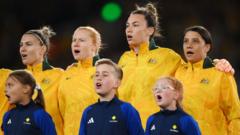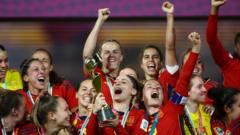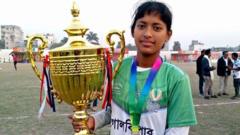Following disrespectful remarks about Australia's women's football team, radio host Marty Sheargold has issued an apology. His comments were labeled misogynistic, prompting a strong response from Football Australia and public figures emphasizing the importance of respect in discussions about women's sports.
Australian Radio Host Apologizes for Misogynistic Comments on Women's Football

Australian Radio Host Apologizes for Misogynistic Comments on Women's Football
Marty Sheargold faces backlash after derogatory comments about the Matildas, sparking widespread criticism and calls for greater respect in sports commentary.
Australian radio presenter Marty Sheargold has issued an apology after making derogatory comments about the national women's football team, the Matildas, which many found misogynistic and disrespectful. His remarks, aired on Triple M, likened the players to "year 10 girls" and suggested that their matches were dull, causing immediate backlash from fans and industry leaders.
Football Australia condemned Sheargold's comments, asserting that they were "unacceptable" and "deeply disappointing," and noted that such statements diminish the team's historic achievements, including their position as semi-finalists in the recently held Women's World Cup. In response to the outcry, Sheargold released a statement acknowledging that his humor "might miss the mark," and sincerely apologized for any offense caused.
During his drive-time show on Monday, Sheargold made several comments that belittled women's football, prompting laughter from his co-hosts. When discussing Australia's defeat at the SheBelieves Cup, he made an inappropriate comparison, highlighting his lack of regard for the sport. His remarks included disparaging comments about upcoming women's tournaments and dismissing them in favor of men's sports.
Southern Cross Austereo, the parent company of Triple M, expressed that Sheargold's views do not reflect their support for all sports, saying, "We are sorry for any offence caused." Additionally, Minister for Sport Anika Wells called the remarks “boorish, boring and wrong,” pointing out the high viewership of women's football events, which have set historical records in Australia.
Australian Olympian Ambrosia Malone also took to social media to voice her disappointment, expressing concern for young girls who might have been listening and felt hurt by the comments. The incident has sparked a renewed call for media personalities to engage in more respectful and constructive discussions surrounding women's sports and their contributions. Football Australia reiterated the essential role of thorough and sensitive media portrayal of women's sports and athletes.








